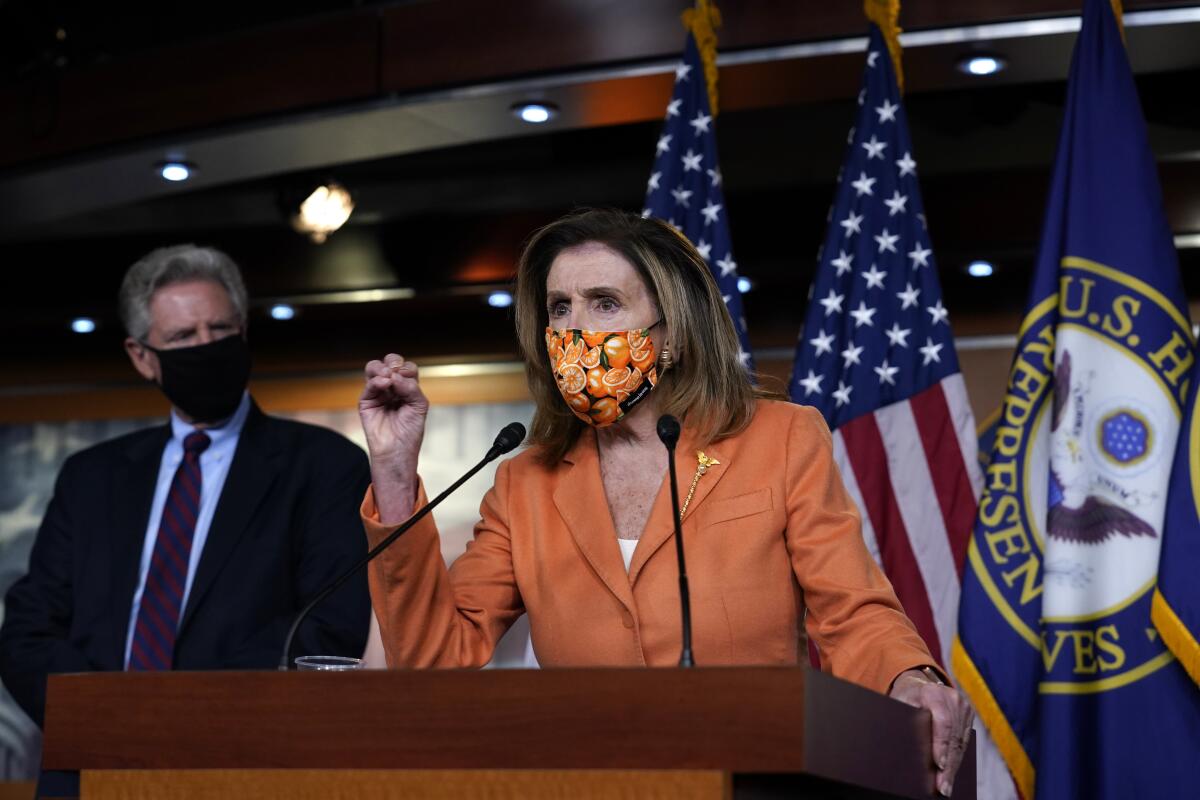Despite Pelosi’s confident predictions, House Democrats lost seats. What happened?

WASHINGTON — After confidently predicting Democrats would expand their House majority, Speaker Nancy Pelosi is having to explain why it looks like they will actually lose seats.
Democrats will keep the House majority, but the losses there come as Democrats appear likely to take the White House and improve their numbers in the Senate.
Republicans flipped seven Democratic House seats so far, mostly in districts President Trump had carried in 2016 and then were won by Democrats in the 2018 midterm. Democrats have gained two GOP seats.
To control the House, 218 seats are needed. In the current Congress, Democrats have 232 to Republicans’ 197. According to an estimate by election handicapper the Cook Political Report, Republicans could end up with a net gain of between five and 10 seats. More than three dozen races have yet to be called.
In a private call with Democrats on Thursday, Pelosi (D-San Francisco) spoke about the “challenging election” and “tough races,” according to a participant.
“We held the House. Joe Biden is on a clear path to be the next president of the United States. This has been a life or death fight for their very fate of our democracy. We did not win every battle, but we did win the war,” she said.
The fate of the presidency still hangs in the balance as President Trump and Joe Biden duel over a few remaining battleground states.
That was a very different tone from the one expressed in the days leading to the election, when Pelosi and Democratic Congressional Campaign Committee Chairwoman Cheri Bustos (D-Ill.) boasted to reporters that Democrats would increase their majority.
Pundits spoke of Democrats winning five to 15 new seats. Before election day, Bustos told reporters Democrats were confident as they reached deep into Trump country. As it turned out, Bustos ended up only narrowly winning a nail-biter of a race for her own seat.
Pelosi on Thursday told her colleagues that Trump’s presence on the ballot this year made it more difficult to retain some of the seats they flipped two years ago.
“In 2018, we won 40 seats. We went deep into Trump districts when Trump was not on the ballot. But clearly with Trump on the ballot, we knew it would be a steeper climb,” Pelosi said on the call. “So far, of the 30 districts that Democrats currently hold that Trump won in 2016, we have won or are ahead in 70% of those races.”
Among those losing Tuesday was Democrat Rep. Xochitl Torres Small, a water rights lawyer in a rural New Mexico district. She was defeated in a rematch against Yvette Herrell, a Republican former state legislator who tied herself closely to Trump. Oklahoma Democrat Kendra Horn lost her suburban Oklahoma City district to Stephanie Bice, a Republican state senator, who criticized Horn for not standing up to Pelosi in Washington.
The losses threaten to reignite familiar intra-party fighting between progressives and moderates, a battle Democrats cannot afford with a narrower majority. On the Thursday call, moderate members who lost, or nearly did, blamed their progressive colleagues, saying the talk of “defunding the police” or “banning fracking” was used in attack ads during the election.
Others in close races have said the failure to reach a compromise with Republicans to pass a coronavirus stimulus relief bill hurt them.
For two years, Pelosi has navigated the competing needs and demands of progressives and moderates. Oftentimes her top priority has appeared to be protecting the moderates, whose 2018 wins gave Democrats the majority again.
Despite prodding from progressives, she refused to bring up legislation to endorse Medicare for All or massive climate change protections — mostly to protect moderates from having to defend such a vote. She resisted calls to impeach Trump that started nearly the day he was inaugurated until a handful of moderates with national security experience said they were on board. In the end, however, those efforts weren’t enough to help all of the vulnerable Democrats.
Bustos blamed bad polling for the disappointing losses, according to people on the call. She promised a postelection postmortem would be completed. Some have quietly indicated it would be best if she doesn’t seek another term leading the party’s campaign arm.
“I’m furious. Something went wrong here across the entire political world,” she said, according to people on the call. “They all pointed to one political environment — but voters who turned out look a lot like 2016.”
Others pointed to Democratic spending to make inroads into places such as Arkansas, hoping the president’s unpopularity would push their candidates in red states across the finish line. Or the heavy focus on Texas, where they ended up not winning a single new House seat, though one is still uncalled.
Rep. Jared Huffman (D-San Rafael) said it shouldn’t have been a surprise that Democrats faced an uphill battle in keeping the 30 seats they won from Republicans in 2018.
“I think we allowed our exuberance to run a bit ahead of a rational and cold-blooded view of the political reality,” Huffman said. “Obviously with the benefit of hindsight, you have to question if we spread our ambitions too thin instead of having a more focused defense of our front-liners.”
Not all the incumbents who lost were moderates in districts that Trump won in 2018. Two Democratic congresswomen from the Miami area of southern Florida also lost their races to Republican challengers.
Rep. Donna Shalala, a Clinton administration veteran, was defeated by television broadcaster Maria Elvira Salazar. Rep. Debbie Mucarsel-Powell lost to well-known Miami-Dade County Mayor Carlos Giménez.
Times staff writers Jennifer Haberkorn and Tracy Wilkinson contributed to this report.
More to Read
Get the L.A. Times Politics newsletter
Deeply reported insights into legislation, politics and policy from Sacramento, Washington and beyond. In your inbox three times per week.
You may occasionally receive promotional content from the Los Angeles Times.












